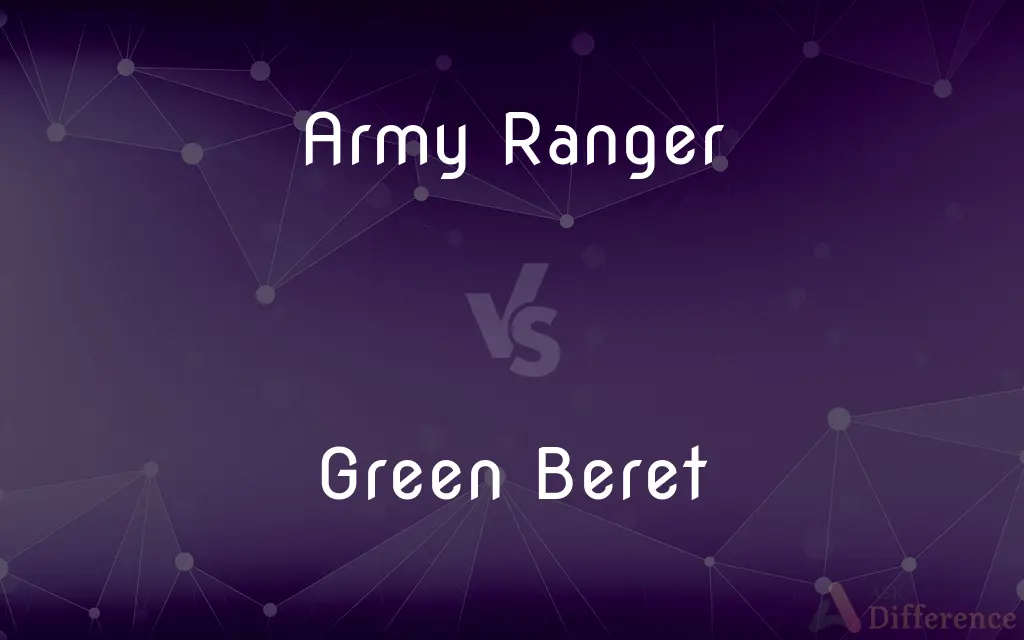Army Ranger vs. Green Beret — What's the Difference?
By Tayyaba Rehman — Published on January 20, 2024
Army Rangers are elite airborne light infantry, specializing in direct action operations, while Green Berets, or Special Forces, focus on unconventional warfare and foreign internal defense.

Difference Between Army Ranger and Green Beret
Table of Contents
ADVERTISEMENT
Key Differences
Army Rangers are a part of the U.S. Army's elite Ranger Regiment, trained for quick-strike and direct action missions. Green Berets, officially known as U.S. Army Special Forces, specialize in unconventional warfare, counter-terrorism, and special reconnaissance.
Rangers often undertake missions like raids, airfield seizures, and reconnaissance, with a focus on swift and decisive operations. Green Berets, on the other hand, are trained for deeper immersion in foreign cultures, working with and training local forces and conducting diplomatic and humanitarian missions.
The training for Army Rangers includes the rigorous Ranger School, emphasizing physical endurance, small-unit tactics, and airborne operations. Green Beret training involves the Special Forces Qualification Course, which is longer and includes language training, unconventional warfare tactics, and survival skills.
Army Rangers are known for their versatility and rapid deployment capabilities in diverse environments. Green Berets are recognized for their skills in languages, diplomacy, and working with indigenous forces to achieve strategic objectives.
While both forces are part of the U.S. Army's Special Operations Command, Rangers are primarily focused on direct combat, whereas Green Berets have a broader role that includes guerrilla warfare, advising, and training allied forces.
ADVERTISEMENT
Comparison Chart
Primary Role
Direct action operations, quick strikes
Unconventional warfare, advising allied forces
Key Missions
Raids, airfield seizures, reconnaissance
Counter-terrorism, foreign internal defense
Training Focus
Physical endurance, small-unit tactics
Language, diplomacy, survival skills
Deployment
Rapid, versatile in various environments
Longer-term, culturally immersive
Tactical Approach
Direct combat focused
Guerrilla warfare, training local forces
Compare with Definitions
Army Ranger
They undergo rigorous training in the Ranger School.
After completing the demanding Ranger School, he became an Army Ranger.
Green Beret
They are experts in foreign internal defense and counter-terrorism.
As a Green Beret, he played a key role in counter-terrorism operations abroad.
Army Ranger
Rangers operate in small units to carry out precise military objectives.
The Army Ranger team conducted a precision strike on the enemy compound.
Green Beret
Special Forces training includes survival and guerrilla warfare tactics.
Surviving in hostile environments is a key part of a Green Beret's training.
Army Ranger
Rangers specialize in airborne operations and rapid deployment.
The Army Rangers were air-dropped into hostile territory for reconnaissance.
Green Beret
They are skilled in diplomacy and working alongside indigenous forces.
The Green Beret's diplomatic skills were crucial in gaining the trust of the village elders.
Army Ranger
Army Rangers are elite infantry units trained for high-stakes, direct action missions.
The Army Ranger unit swiftly executed a successful raid against the target.
Green Beret
Green Berets undergo extensive language and cultural training.
His fluency in multiple languages as a Green Beret helped build relations with local allies.
Army Ranger
Army Rangers are known for their physical endurance and combat skills.
His physical fitness and tactical knowledge as an Army Ranger were unparalleled.
Green Beret
Green Berets, or U.S. Army Special Forces, specialize in unconventional warfare.
The Green Beret team trained local forces to resist enemy occupation.
Common Curiosities
Are Army Rangers considered Special Forces?
While they are part of the Special Operations community, they are distinct from Special Forces (Green Berets).
What roles do Green Berets typically serve in?
Green Berets specialize in unconventional warfare, including advising and training allied forces, counter-terrorism, and special reconnaissance.
How long is the training for Army Rangers?
Ranger School is approximately 61 days, focusing on physical endurance and combat skills.
What language skills are required for Green Berets?
Green Berets receive language training as part of their preparation for working in foreign environments.
What is the primary function of an Army Ranger?
Army Rangers are trained for direct action missions and rapid deployment in various combat situations.
Can Green Berets be involved in direct combat?
Yes, while their primary role is unconventional warfare, they can also engage in direct combat when necessary.
What types of missions do Army Rangers undertake?
Rangers undertake missions like raids, airfield seizures, and reconnaissance operations.
How are Army Rangers selected?
Soldiers must pass a rigorous selection process, including physical, mental, and tactical tests, to join the Ranger Regiment.
What makes Green Berets unique in the U.S. military?
Their expertise in unconventional warfare, language, and cultural training, and their role in advising and training indigenous forces.
Do Green Berets work with other countries' militaries?
Yes, working with and training other countries' militaries is a primary function of Green Berets.
Do Green Berets conduct training for foreign militaries?
Yes, training and advising foreign militaries is a key role for Green Berets.
Can Army Rangers serve in various environmental conditions?
Yes, they are trained to operate in diverse environments, from deserts to jungles.
What is the physical training like for Army Rangers?
It's extremely demanding, focusing on physical endurance, strength, and combat readiness.
Are Army Rangers always deployed in small units?
Rangers typically operate in small units for precise, targeted missions.
What is the Special Forces Qualification Course for Green Berets?
It's a comprehensive training program for Green Berets that includes language training, unconventional warfare tactics, and survival skills.
Share Your Discovery

Previous Comparison
Cisco Jabber vs. Microsoft Teams
Next Comparison
Autonomous College vs. Non-Autonomous CollegeAuthor Spotlight
Written by
Tayyaba RehmanTayyaba Rehman is a distinguished writer, currently serving as a primary contributor to askdifference.com. As a researcher in semantics and etymology, Tayyaba's passion for the complexity of languages and their distinctions has found a perfect home on the platform. Tayyaba delves into the intricacies of language, distinguishing between commonly confused words and phrases, thereby providing clarity for readers worldwide.












































